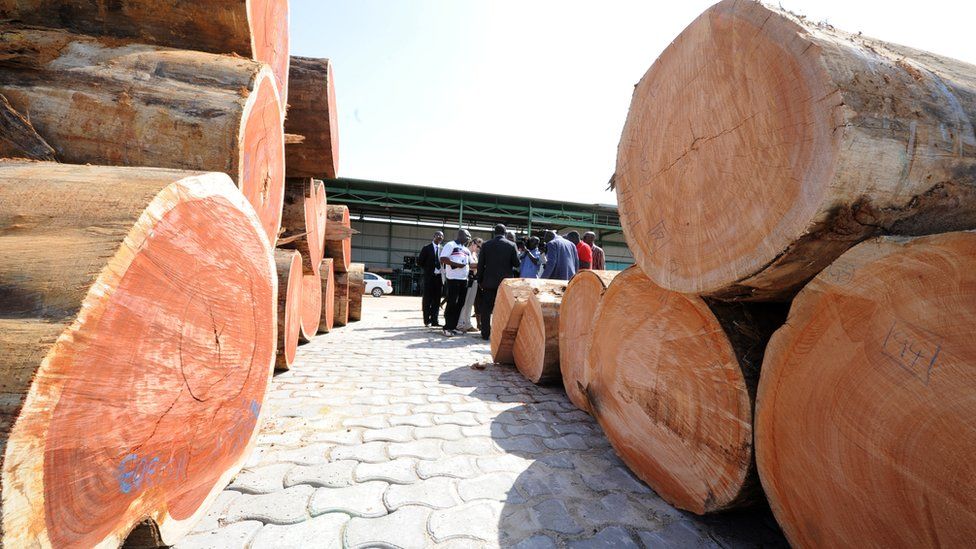Gabon timber scandal: How 300 containers of kevazingo went missing
- Published

Gabon's President Ali Bongo has sacked his vice-president and his forestry minister amid a timber-smuggling scandal.
No reason was given for the sackings but it comes after 300 containers of kevazingo wood - which is illegal to export - were discovered at a port.
There is demand for the wood in Asia where it is used to make furniture.
Nearly two-thirds of Gabon is covered in forests and the timber industry is important for the country's economy.
What is so special about the wood?
Kevazingo, which is better known as bubinga or guibourtia, is a reddish type of wood found in West Africa.
Some trees in Gabon are more than 500 years old and they can be considered sacred by local people.
But timber from kevazingo is highly valued in parts of Asia, where it is used to make high-end furniture and music instruments.
The government banned the export of kevazingo in 2018 in an effort to protect the country's resources.
How much wood went missing?
Last month, more than 350 containers of the precious timber were discovered at the port of Owendo, outside the capital, Libreville, ready to be exported.
They were found in depots belonging to Chinese companies, falsely labelled, allegedly with the forestry ministry label.
Then the containers mysteriously disappeared. About 200 of them have since been recovered.
It is not clear how much the missing wood was worth. Reuters news agency says it had a street value of $250m (£200m) but the prosecutor running the case, Olivier Nzaou, said he couldn't comment because it was an ongoing investigation.
What does this mean for Gabon?
The authorities have vowed to pursue those responsible in an investigation known as "kevazingogate".
The dismissal of Vice-President Pierre Claver Maganga Moussavou and Forestry Minister Guy Bertrand Mapangou are believed to be linked to this investigation, although no official reason for their sackings, or details on their alleged involvement, were given.
Some 13 other officials were suspended last week and a Chinese businessman was named as the mastermind behind the illegal operation.
In recent days, there had been calls for Mr Mapangou to resign. A document which appeared to bear his signature - authorising a Chinese company to export the containers - had been circulating online. He said it was a fake document and has denied any involvement in the scandal.
Some observers in Gabon suggest that the real reason for Mr Maganga Moussavou's sacking could have been his ambition. When President Ali Bongo was recovering from a stroke last year, Mr Maganga Moussavou is said to have expressed the desire to take on more responsibilities. He has not commented on the timber scandal.
President Bongo, now back in the front seat, has signalled he intends to take a strong stand and pursue this investigation.
- Published1 September 2023
- Published22 July 2013
- Published22 July 2013
- Published2 August 2018
- Published10 May 2019
- Published31 October 2018